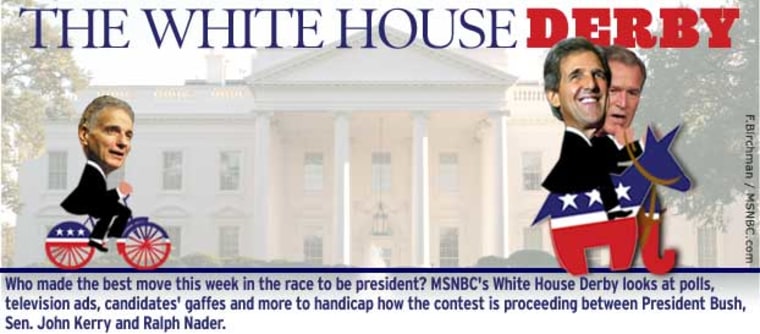This was a week in which President Bush’s poll numbers brought little but bad news to the president and his re-election strategists.
A survey released Wednesday by the Pew Research Center showed Democrat John Kerry holding a 46 percent to 43 percent lead over Bush when independent Ralph Nader is included.
Only 44 percent of respondents approved of the job Bush is doing as president, a decline from 58 percent in Pew’s January survey.
The question Bush and his strategists now confront: Is he in the same fix as his father in the 1992 election or Jimmy Carter in 1980, who looked feckless in the face of the Iran hostage crisis?
But one couldn’t help notice that in a week dominated by a clash of pornographic images — the video beheading of American Nick Berg by Islamic fanatics vs. photos of sadistic abuse by U.S. soldiers of Iraqi prisoners — Kerry had spent much of his time talking about peripheral issues such as reopening the investigation into the 1955 murder of black teenager Emmett Till and lowering the cost of medical insurance for small-business owners.
Except for an interview on Don Imus’s radio show on Wednesday, Kerry was mostly detached from the wrenching issue of the day: Iraq.
Kerry did tell Imus, “I just think the president is making just catastrophic mistakes for our country. I think I can fight a more effective war on terror. ... I believe I could bring other countries to the table. ... I believe I can do a better job in the long run of eliminating this kind of targeting of America that’s taken place over the course of the last year largely because the president has been so ineffective in his international diplomacy.”
Indirect approach
At one campaign rally in Arkansas this week, Kerry did indirectly allude to casualties in Iraq, harkening back to the Clinton era by saying no Americans in uniform were dying in a war when Bill Clinton left the White House.
Even though the Pew poll showed most respondents thinking Bush had led the United States into a perilous situation in Iraq, a majority also gave Bush credit for steadfastness.
When asked whether the phrase “willing to take a stand, even if unpopular” better describes Bush or Kerry, 65 percent of respondents said it describes Bush; only 23 percent said it applied to Kerry.
Fifty percent of respondents called Bush “a strong leader,” while only 31 percent said Kerry fit that bill.
So the paradoxical public attitude at this point might be described as, “We’re uneasy about where Bush is leading us, but we admire his strong leadership.”
This is a wartime election, unlike the election Bush's father lost in 1992. From now until Nov. 2, Bush has the job, so he has opportunities to demonstrate war leadership. He’ll also be blamed if American casualties soar.
Kerry can only talk
Kerry can only tell voters what he would do if he were in charge.
Meanwhile, the question of whether Nader will be in the contest in enough states to make a difference resurfaced.
Nader’s supporters failed to meet the May 10 Texas ballot access deadline by falling short of the required 64,076 signatures.
Can we draw inferences from Nader’s Texas failure as to how his effort will go in other states? Nader spokesman Kevin Zeese assured us he will be on the ballot in more than 45 states.
Nader won the backing of the Reform Party this week, guaranteeing him ballot lines in seven states, including Florida (27 electoral votes) and Michigan (17 electoral votes).
